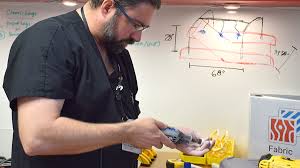As a nurse, you come in contact with problems all the time and you likely Macgyver your own solutions everyday.
If you’ve ever wished for the ability to create real tools that would make your job easier or make your patients more comfortable, you may get an opportunity to do just that---if you find your way to a MakerHealth Space.
The MakerHealth Space spawned from the makerspace movement.
In case you’re unfamiliar with the concept, makerspaces are about harvesting a space where people can work to flesh out concepts and create gadgets, ultimately supporting innovation in different industries.
There are makerspaces for a variety of causes, like engineering, athletics, and now healthcare.
Nurses at the University of Texas will get a chance to create or improvise tools that can help them take better care of patients at their new MakerHealth Space lab.
The MakerHealth Space lab was built by the Boston-based project, Maker Nurse and it’s the first permanent Maker Health Space in the U.S.
However, there are a number of mobile locations across the country.
Maker Nurse aims to foster an environment where nurses can innovate and also take advantage of others’ innovations in healthcare.
Caregivers have made all kinds of inventions, from simple “cough pillows” made with blankets and medical tape, to more tech savvy, sophisticate creations.
An example of a neat creation that could come from a makerspace is a a tool like, Vitality Glow Cap, a pill bottle sensor placed on top of a medicine bottle. It reminds patients to take their medicine on time, getting their attention with chirping and glowing.
The MakerHealth Space at UT is stocked with adhesives, fasteners, electronics, sensors, traditional tools like sewing needles and 3D printers.
Nurses can test out their ideas in spaces designed to address specific issues like assistive technology and fluid control.
“It’s dedicating a space to supporting them in making things more comfortable for their patients and in making them more efficient,” said David Marshall, chief nursing officer at John Sealy in a MedCity News report.
Each new invention or modification is sterilized and tested before it’s “put into service”, to avoid putting anyone at risk.
The MakerHealth Space opened nearly two week ago. Within the first week, 105 nurses came through to visit, and about 10 projects are underway.




